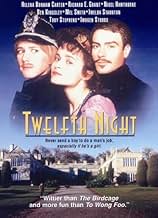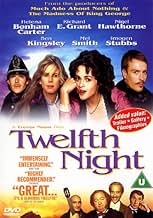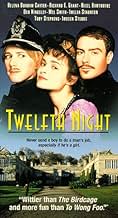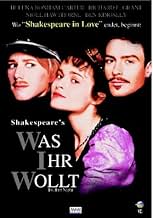NOTE IMDb
7,1/10
6,6 k
MA NOTE
La comédie de Shakespeare sur la confusion des genres, dans laquelle une fille se déguise en homme pour être près du comte qu'elle adore, pour être ensuite poursuivie par la femme qu'il aime... Tout lireLa comédie de Shakespeare sur la confusion des genres, dans laquelle une fille se déguise en homme pour être près du comte qu'elle adore, pour être ensuite poursuivie par la femme qu'il aime.La comédie de Shakespeare sur la confusion des genres, dans laquelle une fille se déguise en homme pour être près du comte qu'elle adore, pour être ensuite poursuivie par la femme qu'il aime.
- Réalisation
- Scénario
- Casting principal
- Récompenses
- 1 victoire et 2 nominations au total
Sidney Livingstone
- Captain
- (as Sid Livingstone)
David Burke
- Party Guest
- (non crédité)
- …
Avis à la une
Trevor Nunn's beautifully photographed and acted, deftly written film is one of the most enjoyable adaptations of a Shakespeare play ever made. Helena Bonham Carter is pitch perfect as the beautiful Olivia, who in "deep mourning" for her dead brother, falls in love with Cesario (who happens to be a woman named Viola dressed up as a man, wonderfully played by Imogen Stubbs, the only actress I've ever seen able to create both a charming Viola and a totally believable Cesario), meanwhile Viola falls for the Duke of fictional Illyria (the exquisite Toby Stephens) who is desperately in love with the Lady Olivia. Meanwhile, Viola's lost twin brother (Steven Mackintosh of "Gentlemen Don't Eat Poets", excellent again here) winds up in Illyria and adds to the confusion. Wonderful, layered support comes from Ben Kingsley playing Feste, Olivia's fool. The only flaw, perhaps, is the few minutes before the conclusion when everything seems to be coated with a thick gloss of sugar; the film comes through this unscathed. Trevor Nunn comes through with an exquisite Shakespeare film adaptation (which is a do or die task). A great showcase for the heavenly cast featuring some of the best performances ever by Bonham Carter (save "Wings of the Dove"), Kingsley (in his best supporting turn ever), novice Stubbs, and Stephens. A very worthwhile effort. Rent it, you won't be let down.
Reading other reviews of 'Twelfth Night' it is interesting to see that some people think it is a slow film and others quite fast. It gripped me from the opening gust of rain on a dark night to Feste dancing off into the sunset. Grappling with Shakespeare is a perilous activity but I thought Trevor Nunn brought out the comedy and the emotions of the story well. It is a film to make you smile at the follies of mankind but also their charm.
Ben Kingsley is amazing. I've never seen Feste played that way but it seemed perfect. Imogen Stubbs does the comedy and the drama equally well. The scene with Orsino in the bathtub is a stock one but she does it beautifully, balancing the humour of the situation with the tenderness and the longing. Imelda Staunton brings unusual depth to the character of Maria. The rest of the cast are great too.
The text of the play is changed around but not unnaturally so. The scene that cuts between Feste's song and Viola/Cesario and Orsino playing cards is wonderful, taking in eight of the characters and telling you more about them. The last act of the play is difficult to stage well but Nunn gives it a good shot.
The Cornwall setting is lovely, the radiant sunshine, the green leaves and fine buildings are captured gorgeously by the cameras. I also liked the music very much and find some of the tunes quite hummable.
Very enjoyable and worth seeing again and again.
Ben Kingsley is amazing. I've never seen Feste played that way but it seemed perfect. Imogen Stubbs does the comedy and the drama equally well. The scene with Orsino in the bathtub is a stock one but she does it beautifully, balancing the humour of the situation with the tenderness and the longing. Imelda Staunton brings unusual depth to the character of Maria. The rest of the cast are great too.
The text of the play is changed around but not unnaturally so. The scene that cuts between Feste's song and Viola/Cesario and Orsino playing cards is wonderful, taking in eight of the characters and telling you more about them. The last act of the play is difficult to stage well but Nunn gives it a good shot.
The Cornwall setting is lovely, the radiant sunshine, the green leaves and fine buildings are captured gorgeously by the cameras. I also liked the music very much and find some of the tunes quite hummable.
Very enjoyable and worth seeing again and again.
In Illyria, Orsino (Toby Stephens), a nobleman, is saddened because he cannot have the love of Lady Olivia (Helena Bonham-Carter) who is mourning the loss of her brother. Meanwhile, twins Sebastian (Stephen Mackintosh) and Viola (Imogen Stubbs) both survive a terrible shipwreck off the coast, but each thinks the other has died. Viola takes the guise of a man and goes to work in the household of the nobleman, falling in love with Duke Orsino. Meanwhile Olivia is taken with Viola who calls herself Cesario. This is the premise of one of William Shakespeare's most appealing comedies, Twelfth Night: Or What You Will, updated from Elizabethan England to late 19th century and brought to life by director Trevor Nunn. It is one of the best interpretations of Shakespeare that I have seen on film.
Reminiscent of other Shakespearean cross-dressing comedies such as As You Like It, Twelfth Night is mostly about the ins and outs of romantic love but it is also about pride, "overweening ambition", disguises, and mistaken identities. The play contains some of Shakespeare's most memorable characters: Sir Toby Belch (Mel Smith), Olivia's drunken uncle, his friend Sir Andrew Aguecheek (Richard E. Grant) who is also trying to court Olivia, Olivia's gentlewoman Maria (Imelda Staunton), Feste (Ben Kingsley), the house clown, and Malvolio (Nigel Hawthorne) the prudish steward. Nunn has assembled a cast that more than does justice to the play. Imogen Stubbs as Viola actually looks like a handsome young man and has a sense of purity and innocence that makes her instantly likable. Helena Bonham Carter brings warmth to the character of Olivia who like Orsino seems to be in love with the idea of love not the reality. Some have noticed a similarity between the character of Olivia and Queen Elizabeth and interestingly, Olivia is addressed by Feste as "madonna", the only time the word is used in all of Shakespeare, perhaps a wry comment about the myth of the Virgin Queen.
The main story involves a love triangle between Orsinio, Viola, and Olivia but the minor characters have more than ample time on stage. Malvolio is both a comic and a tragic figure, said to caricature Sir Christopher Hatton, a courtier, romantic pursuer of the Queen and rival of the Earl of Oxford. Hatton was so fawning Elizabeth called him her "sheep" or "mutton" and this allusion is present early in the play as Malvolio is called a "rascally sheep-biter", harking back to Hatton's letter assuring Elizabeth that "The sheep hath no tooth to bite while the Boar's (Oxford) tusk doth raze and tear." Malvolio is a puritan who rails against people having fun, a trait that earns him the enmity of Sir Toby and Maria. To strike back, Maria engineers a joke on Malvolio. She forges a love letter supposedly from Olivia telling him that if he wants her to notice him, he should dress in yellow stockings and crossed garters and, as he woos Olivia dressed in his strange attire, Malvolio cuts a ridiculous figure (incidentally this is the same costume worn by Henry VIII when he danced with Anne Boleyn, Queen Elizabeth's mother, at a masked ball, before he had her beheaded for adultery).
While there are many great performances, the star for me is Ben Kingsley who is totally convincing as Feste, a fool but a knowing one who functions as an objective commentator of the scene around him, exuding an air of righteous superiority. His portrayal of the priest Sir Topas who interrogates Malvolio in a darkened room has overtones of the 1581 trial and execution of Edmund Campion, a Jesuit priest who was executed by the English government in 1581. In his speech of less than fifty words, which appears to resemble nothing but nonsense, there are no less than five phrases which refer directly to Edmund Campion and his 1580-81 mission to England.
Richard Desper has pointed out that the mock trial scene works as a parody of the government persecution of Catholic martyrs. "The playwright," he writes, "demonstrates for us a world turned upside down, with clowns passing themselves off as men of learning, while men of learning are pressed to deny what they believe to be true to serve political ends." The ending is too delightful to give anything away but it reminded me of the Ingmar Bergman comedy Smiles of a Summer Night, where mismatched couples get together at a summer cottage to sort everything out. Malvolio is pitiable in trying to redeem a shred of dignity but we feel for him when he exits saying, "I shall be revenged on the whole pack of you". As he leaves, he is the only person suffering in a sea of happy faces, those on screen as well as those at home.
Reminiscent of other Shakespearean cross-dressing comedies such as As You Like It, Twelfth Night is mostly about the ins and outs of romantic love but it is also about pride, "overweening ambition", disguises, and mistaken identities. The play contains some of Shakespeare's most memorable characters: Sir Toby Belch (Mel Smith), Olivia's drunken uncle, his friend Sir Andrew Aguecheek (Richard E. Grant) who is also trying to court Olivia, Olivia's gentlewoman Maria (Imelda Staunton), Feste (Ben Kingsley), the house clown, and Malvolio (Nigel Hawthorne) the prudish steward. Nunn has assembled a cast that more than does justice to the play. Imogen Stubbs as Viola actually looks like a handsome young man and has a sense of purity and innocence that makes her instantly likable. Helena Bonham Carter brings warmth to the character of Olivia who like Orsino seems to be in love with the idea of love not the reality. Some have noticed a similarity between the character of Olivia and Queen Elizabeth and interestingly, Olivia is addressed by Feste as "madonna", the only time the word is used in all of Shakespeare, perhaps a wry comment about the myth of the Virgin Queen.
The main story involves a love triangle between Orsinio, Viola, and Olivia but the minor characters have more than ample time on stage. Malvolio is both a comic and a tragic figure, said to caricature Sir Christopher Hatton, a courtier, romantic pursuer of the Queen and rival of the Earl of Oxford. Hatton was so fawning Elizabeth called him her "sheep" or "mutton" and this allusion is present early in the play as Malvolio is called a "rascally sheep-biter", harking back to Hatton's letter assuring Elizabeth that "The sheep hath no tooth to bite while the Boar's (Oxford) tusk doth raze and tear." Malvolio is a puritan who rails against people having fun, a trait that earns him the enmity of Sir Toby and Maria. To strike back, Maria engineers a joke on Malvolio. She forges a love letter supposedly from Olivia telling him that if he wants her to notice him, he should dress in yellow stockings and crossed garters and, as he woos Olivia dressed in his strange attire, Malvolio cuts a ridiculous figure (incidentally this is the same costume worn by Henry VIII when he danced with Anne Boleyn, Queen Elizabeth's mother, at a masked ball, before he had her beheaded for adultery).
While there are many great performances, the star for me is Ben Kingsley who is totally convincing as Feste, a fool but a knowing one who functions as an objective commentator of the scene around him, exuding an air of righteous superiority. His portrayal of the priest Sir Topas who interrogates Malvolio in a darkened room has overtones of the 1581 trial and execution of Edmund Campion, a Jesuit priest who was executed by the English government in 1581. In his speech of less than fifty words, which appears to resemble nothing but nonsense, there are no less than five phrases which refer directly to Edmund Campion and his 1580-81 mission to England.
Richard Desper has pointed out that the mock trial scene works as a parody of the government persecution of Catholic martyrs. "The playwright," he writes, "demonstrates for us a world turned upside down, with clowns passing themselves off as men of learning, while men of learning are pressed to deny what they believe to be true to serve political ends." The ending is too delightful to give anything away but it reminded me of the Ingmar Bergman comedy Smiles of a Summer Night, where mismatched couples get together at a summer cottage to sort everything out. Malvolio is pitiable in trying to redeem a shred of dignity but we feel for him when he exits saying, "I shall be revenged on the whole pack of you". As he leaves, he is the only person suffering in a sea of happy faces, those on screen as well as those at home.
As with most Shakespearian comedies, the plot is deeply implausible. However, the excellent Cornish locations at St Michael's Mount & Lanhyrock give a good sense of place and the winter setting (apart from the scene of apple picking!) comes across well - it really does look like an English winter, rather than a picture postcard snow-scene.
The play is cut down to a manageable length without losing the sense of it, The broad comedy aspects (Toby Belch et al) are thankfully limited.
The acting is well done by a cast of British stalwarts. Amazingly, Viola and Sebastian actually do look broadly alike.
This film is best viewed as an amusing light romantic comedy rather than a side-splitter.
The play is cut down to a manageable length without losing the sense of it, The broad comedy aspects (Toby Belch et al) are thankfully limited.
The acting is well done by a cast of British stalwarts. Amazingly, Viola and Sebastian actually do look broadly alike.
This film is best viewed as an amusing light romantic comedy rather than a side-splitter.
Slick Shakespeare adaptation, well acted and very humorous (in parts) in its telling. Naturally, there's always going to be some differences from stage to cinema. The film took advantage of this, of course, to avoid a "stage" feel. The perceptions, or rather the misperceptions, of people and motivations are well explored and portrayed. Ben Kingsley is a standout, for his interesting twist on the character Feste. In short, a good adaptation and film. Recommended.
Le saviez-vous
- AnecdotesIn the mid 1950s, director Joseph L. Mankiewicz tried to set up a version with Audrey Hepburn and Danny Kaye, but it failed to materialize.
- GaffesFeste's guitar playing for Cesario (Viola) and Orsino does not match up with the soundtrack.
Meilleurs choix
Connectez-vous pour évaluer et suivre la liste de favoris afin de recevoir des recommandations personnalisées
- How long is Twelfth Night?Alimenté par Alexa
Détails
- Date de sortie
- Pays d’origine
- Site officiel
- Langue
- Aussi connu sous le nom de
- Twelfth Night
- Lieux de tournage
- Lanhydrock House, Bodmin, Cornwall, Angleterre, Royaume-Uni(Olivia's house and garden)
- Sociétés de production
- Voir plus de crédits d'entreprise sur IMDbPro
Box-office
- Budget
- 5 000 000 $US (estimé)
- Montant brut aux États-Unis et au Canada
- 588 621 $US
- Week-end de sortie aux États-Unis et au Canada
- 33 451 $US
- 27 oct. 1996
- Montant brut mondial
- 588 621 $US
Contribuer à cette page
Suggérer une modification ou ajouter du contenu manquant

Lacune principale
By what name was La nuit des rois (1996) officially released in India in English?
Répondre



































